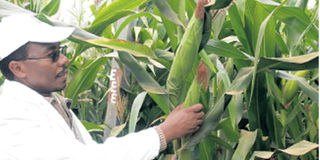The magic of hybrid seeds

A researcher at the National Irrigation Board farm in Mwea with hybrid maize. FILE PHOTO | NATION MEDIA GROUP
One of the most important questions that often comes to farmers’ minds is, “what seeds should I plant?” Now, before rushing to the nearest agrovet or seed stockist, arm yourself with this guide that will enable you select the best seeds that fit the location of your farm.
The altitude
Ask yourself if the crop you are planting suits the altitude of your region. For example for maize, the 6-series which include H614D, H627, H6213, H626, H6210, H629, H6401, H628 and H6212, all from Kenya Seed, are for the high altitude areas (1,800-2,200m above sea level).
While the varieties such as H623, H632, H624 and H622 are suitable for the intermediate altitude (1,500-2,000m above sea level). Similarly, 5-series such as H513, H515 and H516 are more-suited in the medium altitude (1,200-1,800m above sea level).
For the areas receiving rainfall 500-800mm per year with altitude of 900-1,400m above sea level and are classified as dry, the most suitable varieties would be Katumani composite (DH04, DH02 and DH09) and for the coastal strip, Coast composite, PH4 and PH1 are more suited.
Rainfall
Some crops require more rainfall than others. For instance sorghum, millet, chickpea and pigeon pea, normally referred to as dry land crops, can tolerate low rainfall and high temperatures. While the horticultural crops such as vegetables require relatively high rainfall and cooler temperatures.
However, some varieties are specifically bred for drought-tolerance, and they include Korongo for wheat and Katumani composites for maize.
The question, however remains, if I am not sure on how much rain our area will receive for this season, what should I plant? Experts from the Meteorological Department normally advise by looking at the historical data of a particular area and determine how the rainfall will be. However, with the changing climate, it would be better to do timely or early planting.
The magic of hybrids
The change in rainfall pattern has had great impact on our crops in terms of yields in the last few years due to poor seed selection and lack of better timing. Some farmers, thus, are on the verge of abandoning crop farming while others dropped out due to frustrations.
So, how, does one leverage on seeds to boost production?
Go hybrid. It is one of the most lucrative ways of maximising production. Yields one gets are determined first by the seed planted. For instance, H614D has a potential of producing 40 bags per acre while for the local varieties such as Nyamula, the potential is as low as 10 bags per acre.
Our scientists, however, have developed various hybrid seeds to cater for different areas. For instance, in Western Kenya where striga is a menace, a variety Ua Kayongo H1, which is striga-resistant has been developed.
The bottom-line is that hybrids enable us get higher yields compared to the local varieties. They possess superior traits such as drought tolerance and better disease and pest resistance. It is easier to breed these traits into a hybrid rather than into an open-pollinated seed.
In addition to this, hybrid crops are better adapted to various ecological environments and perform well in adverse climatic conditions.
Further, wastage emanating from non-germinated seeds is minimised with hybrids. The farmer is, therefore, cushioned from losses but better results are achieved with proper management.
Proper management means that we will need to apply optimum amounts of fertiliser during planting, top-dressing and flowering. Mature hybrid plants grow physically uniform until they fruit to give a certain desired consistency. This is advantageous to farmers in such a way that it is cheaper and more efficient to manage the crop during the described operations.
Hybrids enable farmers use less seeds per acreage of planting, improving the overall ability to invest in high farming ranks and practice precision agriculture.
Lastly, hybrid products have longer shelf-life, but this goes in handy with proper management.
Ms Muriuki is based at the Department of Crops, Horticulture and Soils, Egerton University.




